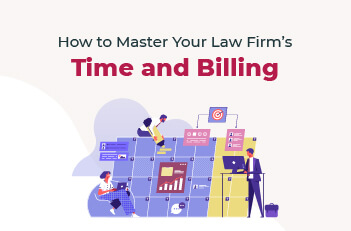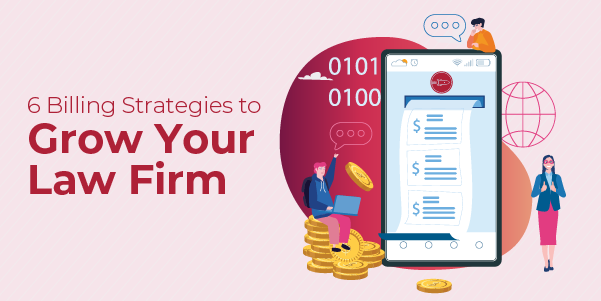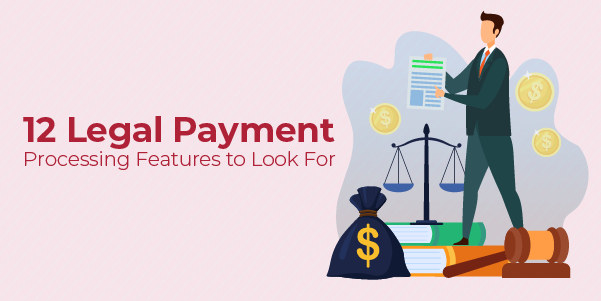Why Not All Payment Processors Are Created Equal

Sure, you can keep sending out invoices and waiting 30 days or more for payment, hunting down clients, and not knowing when you’ll be paid.
Sure, you can get all manner of payments from different payment processors across the internet and in the mail - from Stripe to Paypal, from eChecks to old-timey checks, and back again.
But many of these payment processors each take their own chunk, tariff, and slice, with fees that lack transparency and aren’t so simple to understand.
Not only that, but the common online payment processors are not compliant with ABA and IOLTA guidelines, which is make-or-break for a law firm.
Or, you can change gears by adopting a more common sense approach: a legal-specific payment processor makes it super easy for your clients to pay however they’d like to in just a couple clicks, eliminates guesswork about fees, and keeps you compliant.
The point is, when it comes to payment processors for law firms like yours, not all payment processors are created equal.
It’s important to know the capabilities of each processor, which is right for you, and which will save you time and money (and potentially, your firm’s caboose).
Why average payment processors aren’t right for law firms
If you’re a small or medium-sized law firm, cash flow can be a recurring issue, and you don’t have the capacity to wait around for cash.
What’s more, you don’t want to waste time tracking down bills, cross-checking various online payment providers, and waiting six weeks or more for a payment.
Here are some of the downsides of relying on common online payment processors:
- Fees can range widely, anywhere from 0.05% to 3% of the final payment, which can add up over time.
- Funds take too long to hit your account. eChecks typically take at least 3–5 days, while payment processors usually release credit card funds in 2–3 days. But that’s only part of the problem. The back-and-forth involved in maintaining separate invoicing, billing, and payment processing systems can contribute to long wait times.
- Lack of integration. When you use many separate online payment processors, they don’t “talk” to each other, leading you to have to manually track down and add up invoices and payments.
- Non-compliance. It’s common for payment processors to take a cut of the money being paid, which is not legal-friendly. As you know, fees should be taken from your firm’s account, not your clients’.
- Little or no in-person customer support. If you ever had an issue with a commonplace payment processor, including refunds, you know it can be hard to reach a human being.
- Security concerns. If the payment processor is not built for the legal profession, you are taking a risk. Going with software that offers anything less than multiple built-in security layers and Level 1 Service Provider certification equates to a gamble for your firm’s data security and privacy needs.
What the right law firm payment processors can do
In contrast, the right law firm payment processor allows you to get paid faster, stay compliant, and minimize fees (and more).
Save time and money
When you adopt a payment processor that’s legal-specific, your manual workload shrinks faster than a witness caught lying on the stand.
That’s because a legal-specific processor includes compliance safeguards and often integrates with the other tools you rely on, such as practice management software, time and billing solutions, legal CRM, accounting tools, and more—even your email.
When you get all of these systems working in tandem, you can simply use all your existing client info to generate invoices.
That means you can generate PDFs of invoices in a few clicks, receive payments in less than half a day, and track and analyze all of it in one place.
When you add all that up, you’d have to ask: why would you keep using the commonplace payment processors?
Especially when you could have a built-in payment processing platform with just one clear fee that you can build into your budget, and that includes everything you need to increase your collections rate and lower your accounts receivable (AR).
Get paid faster
When it comes to the time it takes for funds to hit your account, you could also speed things along. Some payment processors hold funds for days before they’re released to your account, while others release payments in as little as 12 hours.
Excited yet?
Think about your legal payment processor like a good lawyer. Prospective clients like to choose a lawyer who has the experience to help. The same goes for a payment processor: you should choose one that has been in the legal profession for years, with a deep roster of successful law firms with proven results.
Stay compliant
Specifically, a robust legal payment processor has to be ABA and IOLTA compliant. Instead of collecting fees from the client’s trust account, a legal-specific processor can collect fees separately from your firm’s operating account.
Giving your clients options
Another important pillar of the right payment processor is giving clients the option to pay how they like. You should be able to offer your clients that kind of flexibility as a pillar of your service.
That means giving clients options. Here are some specific ways to provide client flexibility:
- Online invoicing
- Recurring billing
- Payment plans
- Keeping cards on file for auto-withdrawals
- IOLTA trust compliance
What do these options add up to? Saying goodbye to chasing down clients for payments.
Another feature of a strong legal payment processor is mobile capability. When you use a legal payment processor alongside your practice management software, your clients can pay invoices directly from their phones.
Meanwhile, you can provide clients with the extra bonus of 100% paperless statements.
Where Rocket Matter Pay comes in
While regular online payment processors take days to process payments, hit you with multiple fees, lack customer service, and are not built to be ABA compliant, Rocket Matter Pay is the rapid, secure, and easy-to-use payments solution purpose-built for law firms.
Give your clients the flexibility to pay however they like while you save on fees and operational headaches. Receive those payments quickly, safely, and all in one place.
Rather than tracking down who owes you what, let us know when you want to start saving time and ensuring the cash flow you need to grow your firm.
Schedule a demo today to save time and money with Rocket Matter.
Related Resources

How to Increase Your Profits with Rocket Matter
Lawyers in firms of all sizes struggle to finish the work for the day in a reasonable amount of time. With document creation, non-billable tasks, and time spent following up with current and potential clients, the workday quickly turns from a planned eight-hour day into a twelve-hour one.

How to Master Your Law Firm’s Time and Billing
Lawyers have a heavy workload. With so many clients and their various needs, it’s easy to put tedious administrative tasks like time tracking and billing on the back burner.

6 Billing Strategies to Grow Your Law Firm
Scaling your law firm doesn’t just mean adding more lawyers or increasing your number of clients. The best way to boost your law firm’s finances is to minimize your non-billable hours and make sure that every hour of your day is accounted for.
Share post:









